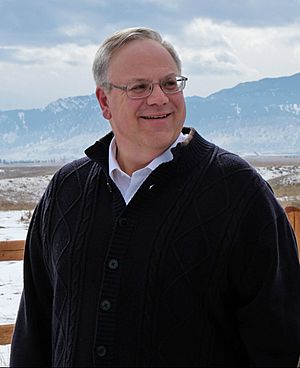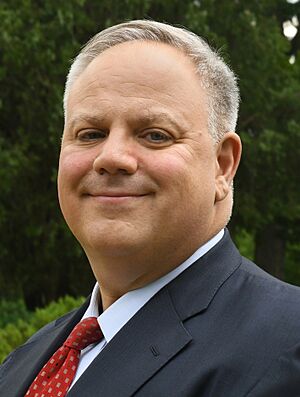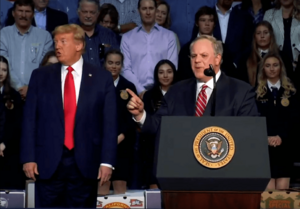David Bernhardt facts for kids
Quick facts for kids
David Bernhardt
|
|
|---|---|

Bernhardt in 2019
|
|
| 53rd United States Secretary of the Interior | |
| In office January 2, 2019 – January 20, 2021 Acting to April 11, 2019 |
|
| President | Donald Trump |
| Deputy | Katharine MacGregor |
| Preceded by | Ryan Zinke |
| Succeeded by | Deb Haaland |
| 7th United States Deputy Secretary of the Interior | |
| In office August 1, 2017 – April 11, 2019 |
|
| President | Donald Trump |
| Preceded by | Michael L. Connor |
| Succeeded by | Katharine MacGregor |
| Solicitor of the United States Department of the Interior | |
| In office October 5, 2006 – January 20, 2009 |
|
| President | George W. Bush |
| Preceded by | Sue Ellen Wooldridge |
| Succeeded by | Hilary Tompkins |
| Personal details | |
| Born |
David Longly Bernhardt
August 17, 1969 Rifle, Colorado, U.S. |
| Political party | Republican |
| Spouse | Gena Bernhardt |
| Children | 2 |
| Education | University of Northern Colorado (BA) George Washington University (JD) |
David Longly Bernhardt (born August 17, 1969) is an American lawyer. He served as the 53rd United States secretary of the interior from 2019 to 2021 under President Donald Trump. Before this, he worked at a law firm in Colorado. There, he was a lobbyist and a lawyer focusing on natural resources. He started working for the United States Department of the Interior (DOI) in 2001. He later became the department's chief lawyer (called the solicitor) from 2006 to 2009. He also served as the deputy secretary from 2017 to 2019.
President Donald Trump chose Bernhardt to be the deputy secretary of the interior in April 2017. The U.S. Senate approved his nomination on July 24, 2017. He officially started his role on August 1. He became the acting secretary of the interior on January 2, 2019, after Ryan Zinke resigned. Bernhardt was then nominated to become the official Secretary of the Interior in February 2019. He was confirmed on April 11, 2019.
Contents
Early Life and Education
Bernhardt grew up in Rifle, Colorado. His father worked as a county extension agent, and his mother was in the real estate business.
Bernhardt was involved in Colorado politics from a young age. When he was sixteen, he spoke to the Rifle City Council. He asked them not to tax arcade games at a teen center he was helping to start. He finished high school early by earning his GED. He then earned his bachelor's degree from the University of Northern Colorado in 1990. While at the University of Northern Colorado, he had an internship at the Supreme Court of the United States. He graduated with honors from the George Washington University Law School in 1994. He became a member of the Colorado Bar Association later that year.
Career Highlights
Early Legal Work
Bernhardt started his career as a lawyer in Colorado. In the 1990s, he worked for U.S. Representative Scott McInnis. McInnis was a Republican from Grand Junction. In 1998, Bernhardt joined Brownstein Hyatt and Farber. This was a law and lobbying firm in Denver.
Working for President George W. Bush
Bernhardt worked for the Department of the Interior during George W. Bush's time as president. Early in his career there, he was a deputy chief of staff. He also advised the then-secretary of the interior, Gale Norton. He also served as the director for congressional and legislative affairs. Later, he became the solicitor (chief lawyer) for the DOI. He was also the U.S. commissioner to the International Boundary Commission for the U.S. and Canada.
President George W. Bush nominated Bernhardt to be the Solicitor of the Department of the Interior in November 2005. He was the DOI deputy solicitor at that time. Bernhardt was approved by the U.S. Senate without any opposing votes. He officially started his role in November 2006. He served as Solicitor from 2006 until January 2009.
Law and Lobbying Work
In 2009, Bernhardt returned to the Colorado-based law firm Brownstein Hyatt Farber Schreck. He became a shareholder in the firm. He also became the chairman of the firm's natural resources law practice. Bernhardt represented various clients, including the Westlands Water District.
He also worked on projects like the proposed Rosemont Copper open pit mine in Arizona. In 2011, Bernhardt filed a lawsuit for the Westlands Water District. This lawsuit aimed to make the government fulfill a promise. The promise was to build a system to manage polluted water from irrigation in the Westlands district.
Working for President Donald Trump
Joining the Interior Department
Until the end of 2016, Bernhardt was a lawyer and lobbyist for the Westlands Water District. In November 2016, he stopped being a registered lobbyist. This was to follow the new president's rule against lobbyists joining his team. After this, Bernhardt became a consultant for the Westlands Water District. He was paid $20,000 per month for this. While still a lawyer at Brownstein Hyatt Farber and Schreck, Bernhardt briefly led the Interior Department transition team for President Donald Trump. In this role, he helped oversee staffing for the Department of the Interior.
Deputy Secretary of the Interior
On April 28, 2017, Trump nominated Bernhardt to be the deputy secretary of the interior. This role made Bernhardt the "top deputy to Interior Secretary Ryan Zinke." He also became the COO of the federal lands and energy agency. Many people praised his appointment, including Zinke and Republican members of Congress. However, some groups, like conservationists and fishing groups, were against his nomination. They pointed to his past work representing oil companies and agricultural interests. They also worried about possible conflicts of interest.
At his confirmation hearing in May 2017, Bernhardt stated that he believed in using science to guide decisions. He also said that the president's views would guide policies when possible. Senators raised questions about ethics. Bernhardt replied that he took ethics very seriously. He said he would not get involved in matters concerning his former clients unless he was allowed to.
On July 24, 2017, the Senate approved Bernhardt's nomination by a vote of 53 to 43. He was sworn into office on August 1, 2017. During his time as deputy secretary and acting secretary, the Department of the Interior increased fossil fuel sales on public land. They also worked to reduce regulations.
In August 2020, an official report found that the agency had held back some public documents about Bernhardt. This happened before his Senate approval. The report concluded that this action did not break any rules.
Secretary of the Interior
On January 2, 2019, Bernhardt became the acting secretary of the interior. He took over from Ryan Zinke. On February 4, 2019, Trump nominated Bernhardt to be the official Secretary of the Interior. The Senate confirmed him on April 11, 2019, with a vote of 56 to 41.
In May 2019, the House Oversight Committee looked into whether Bernhardt was following record-keeping laws. In September 2019, a report found that Bernhardt had broken federal law twice. This happened in January 2019 when he was acting secretary. He told the National Park Service to use park entrance fees for maintenance. This was to keep parks open during the government shutdown. The report said the Interior Department moved money without Congress's permission. The Interior Department disagreed with this conclusion. They said their actions were a proper use of funds.
Bernhardt was chosen as the designated survivor during Trump's 2020 State of the Union Address. This means he would have taken over if something happened to the president and other leaders.
On August 4, 2020, the Great American Outdoors Act became law. President Donald Trump signed it. Bernhardt announced that August 4 would be "Great American Outdoors Day." On this day each year, entrance to national parks would be free.
Bernhardt moved the main office of the Bureau of Land Management from Washington, D.C., to Grand Junction, Colorado. This happened on August 11, 2020. On August 17, 2020, Bernhardt announced plans for oil and gas drilling in the Arctic National Wildlife Refuge. This opened the way for drilling in that remote area of Alaska.
On August 20, 2020, Bernhardt added the site of the 1908 Springfield Race Riot to the National Park Service's African American Civil Rights Network. This network includes sites related to the civil rights movement in the United States.
After Government Service
After leaving the Department of the Interior, Bernhardt returned to his old law firm, Brownstein Hyatt Farber Shreck. He became a senior counsel there. Bernhardt is also the chairman of the America First Policy Institute's Center for American Freedom. In 2023, he published a book titled You Report to Me. Accountability for the Failing Administrative State. The book shares his experiences working in the U.S. Department of Interior.
Personal Life
David Bernhardt lives in Arlington, Virginia, with his wife, Gena. He enjoys hunting and fishing.
See also
 In Spanish: David Bernhardt para niños
In Spanish: David Bernhardt para niños
- Environmental policy of the Donald Trump administration
 | Emma Amos |
 | Edward Mitchell Bannister |
 | Larry D. Alexander |
 | Ernie Barnes |



